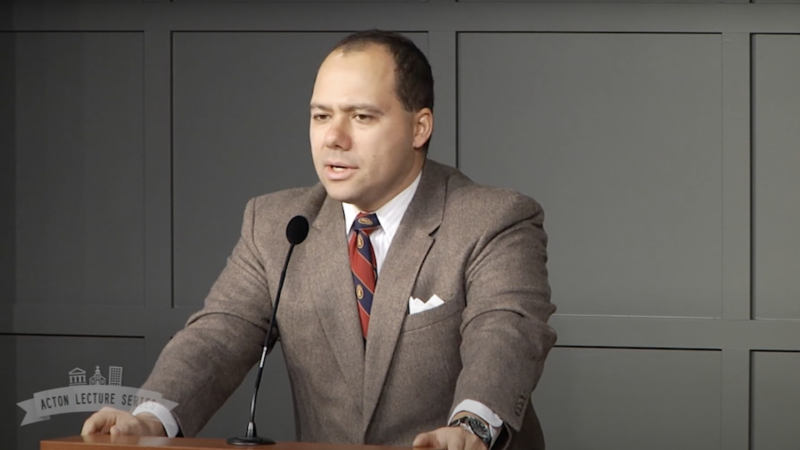Georgetown Suspends Ilya Shapiro, Student Protesters Demand Place to Cry
More than 100 law professors agree that "academic freedom protects Shapiro's views."

Georgetown University Law Dean William Treanor has suspended Ilya Shapiro—a conservative-libertarian legal scholar slated to take the helm of the school's Center for the Constitution—pending an investigation into controversial statements he made on Twitter.
"I am writing to inform you that I have placed Ilya Shapiro on administrative leave, pending an investigation into whether he violated our policies and expectations on professional conduct, non-discrimination, and anti-harassment, the results of which will inform our next steps," Treanor said on Monday.
Shapiro has repeatedly apologized for the tweets, which were poorly phrased and caused some people to think the author and former vice president of the Cato Institute had described black women generally as less qualified for the Supreme Court. Instead, he decried President Joe Biden's stated commitment to choosing Justice Stephen Breyer's replacement from a specific race and gender pool because it would preclude him from selecting Court of Appeals Judge Sri Srinivasan, whom Shapiro believes to be the best candidate.
"I'm optimistic that Georgetown's investigation will be fair, impartial, and professional, though there's really not much to investigate," Shapiro said in a statement.
Georgetown's Black Law Student Association disagrees. Student protesters held a sit-in at the Law Center on Tuesday morning. Treanor attended and was questioned at length by the students, who want Shapiro fired and perhaps the entire center eliminated.
National Review notes that the students' demands include that they be provided with a place to cry:
At another juncture, a student demanded that the dean cover for the classes that the activists had missed as a result of the sit-in, suggesting that the move should be part of a "reparations" package for black students. She followed up by insisting that students be given a designated place on campus to cry. "Is there an office they can go to?" she asked. "I don't know what it would look like, but if they want to cry, if they need to break down, where can they go? Because we're at a point where students are coming out of class to go to the bathroom to cry."
"And this is not in the future," she added. "This is today."
The administrators took the law student's query seriously. "It is really, really hard to walk out of class or a meeting in tears, and you should always have a place on campus where you can go," Dean Bailin told her. "And if you're finding that you're not getting the person that you want to talk to or not getting the space that you need, reach out to me anytime — anytime — and we will find you space."
This level of emotional opposition to Shapiro might make Treanor inclined to fire him; it is not easy to go up against students on an issue like this one. Nevertheless, retaining Shapiro would be the right move—indeed, Georgetown's stated commitments to free speech preclude any other outcome.
More than 100 law professors have signed an open letter calling on Georgetown to abide by its principles and end the investigation in a manner favorable to Shapiro.
"Academic freedom protects Shapiro's views, regardless of whether we agree with them or not," they write. "And debate about the President's nomination, and about whether race and sex play a proper role in such nominations more generally, would be impoverished—at Georgetown and elsewhere—if this view could not be safely expressed in universities. Indeed, to the extent that people do think it's proper for a President to promise to fill a position with a member of a particular group, they can only have real confidence in that conclusion if they know that the contrary view can be freely supported and discussed, and has been found unpersuasive on the merits rather than silenced by fear of firing. That is famously the way academic discourse about science operates. And it is true for moral and political judgments as well."
The Foundation for Individual Rights in Education rightly described Georgetown's investigation into Shapiro as an "embarrassing capitulation" and "antithetical to the tenets of liberal education." The best way to resolve this matter is for Georgetown to end the investigation and reinstate Shapiro so that everyone can move on.


Show Comments (109)